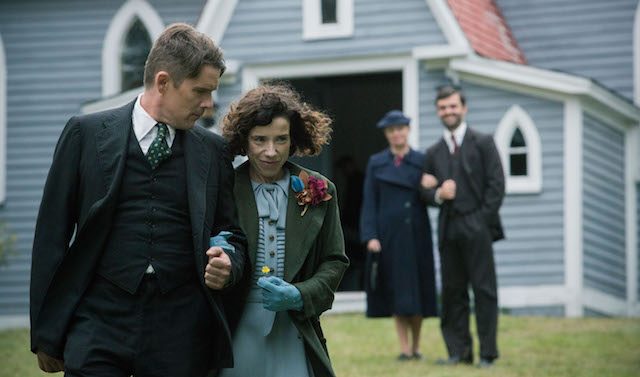
Folk-art buffs and extremely patriotic Canadians may already know the story of Maud Lewis, an arthritic Nova Scotian who sold her simple but charming paintings out of the tiny house she shared with her fishmonger husband in the middle decades of the 20th century. For the rest of us, there’s “Maudie,” a gentle biopic directed by Aisling Walsh (“Song for a Raggy Boy”) and written by Canadian TV producer Sherry White, with the great Sally Hawkins as Maud. It’s not exactly a “Pollock”-level dissection of a tortured artist — but, hey, Maud Lewis wasn’t exactly Jackson Pollock.
When we begin, in approximately the late 1930s, Maud Dowley is a thirtysomething woman living with her Aunt Ida (Gabrielle Rose) because she cannot take care of herself. Or so everyone assumes; we don’t hear any doctors’ opinions. Maud is stiff, walks with a limp, and one of her arms is a bit twisted; our first impression is maybe cerebral palsy. (It’s only in passing much later that the real culprit — arthritis — is mentioned.) Additionally, her wide, innocent grin and halting speech suggest a mental slowness, though this turns out not to be the case. She’s guileless and naive, but she isn’t dumb.
She meets Everett Lewis (Ethan Hawke), a gruff, unlettered bachelor, when he posts an ad for a housemaid. Why he needs a live-in maid to keep things tidy in a 200-square-foot house is not addressed, but I suppose that’s how it was in those days. Even for a rural Canadian fishing village, Everett is old-fashioned. The car he drives has a hand crank, and his little house has no electricity. He doesn’t even have a second bed for his live-in maid — Maud has to share his.
In between her household chores (which she isn’t very good at), Maud passes the time by painting lovely, unsophisticated pictures of birds and flowers and other basic subjects, first on the walls of the house, then on postcards and other scraps. One of Everett’s fishmonger customers (Kari Matchett) with an eye for art and sympathy for a working woman offers to buy a few of them, and next thing you know, Maud and Everett have a modest side business.
Walsh and White present Maud Lewis’ life as a love story of sorts, Everett’s initial indifference and occasional disdain toward Maud growing into affection as he’s won over by her goodness. The film shows no interest in the details of Maud’s health (which were evidently much worse than the film lets on), only using her increasingly stooped posture and withered hands to indicate the passage of time. This isn’t about her art, either, or the fame it brings her; there are no onscreen titles at the end describing her legacy as one of Canada’s most enduring folk artists, or telling us where her work is now.
No, it’s the unorthodox, unromantic love story between two misfits (“a pair of odd socks,” Maud says) who find compatibility. Ethan Hawke, in a role you can picture Clint Eastwood taking 40 years ago, plays Everett’s subtle tenderness effectively. Maud is just a mediocre housekeeper at first, less important to him than his dogs and his chickens (he says so explicitly). But no matter how grumpy Everett gets, Maud remains cheerful and optimistic, seemingly unfazed by him. He warns her on their wedding day that he’s “still gonna be contrary tomorrow,” but Maud knows he’s softening. There is sublime pleasure in watching his evolution.
Of course, that only works because of Hawkins’ portrayal of Maud as a pure, resilient woman who has never harmed anyone and has a smile for everyone. The narrative choice to mostly avoid talking about her physical afflictions and not to dwell on her life’s other setbacks has the added effect of making Maud seem stoic and uncomplaining, earning our esteem rather than our pity. It’s a nice, unassuming movie, such as one might take one’s aged mother to, with a warmth that compensates for its lack of insight.
B (1 hr., 55 min.; )





